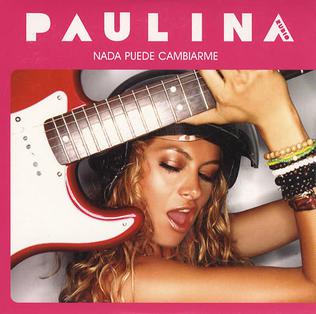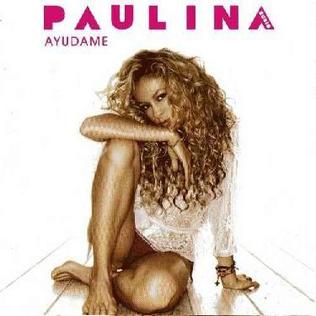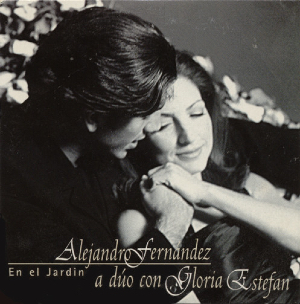
Paulina Susana Rubio Dosamantes is a Mexican singer, songwriter and television personality. Referred to as "The Golden Girl" and "Queen of Latin Pop", she first achieved recognition as a member of the successful pop group Timbiriche from 1982 through 1991. After leaving Timbiriche, she embarked on a solo career. Rubio has sold over 15 million records, making her one of the best-selling Latin music artists of all time.

Ananda is the eighth studio album by Mexican singer-songwriter Paulina Rubio, released on September 18, 2006, through Universal Latino. Its pop rock music incorporates latin, dance, folk, electropop, alternative and flamenco styles with instrumentation from synthpop beats, guitars, drums, synthesizers, strings and Spanish musical instruments. Its themes range from love, empowerment, and dancing. Contributions to the album's production came from a wide range of producers, including Cachorro López, Rick Wake, Tricky Stewart, Áureo Baqueiro, TOY Hernández and Gustavo Santaolalla. Among the songwriters and artist collaborators appear on the album are Xabi San Martín from La Oreja de Van Gogh, Slash from Guns N' Roses, Juanes, Julieta Venegas and Coti.

"Ni Una Sola Palabra" is a song by Mexican singer Paulina Rubio from her eighth studio album Ananda (2006). It was released on July 23, 2006, by Universal Latino, as the lead single from the album. Written by Xabi San Martín, keyboardist of the Spanish pop band La Oreja de Van Gogh, it was intended to be included in one of the band's albums, but Rubio took an interest in the song, and recorded it in 2005 at her home studio in Miami. The song was produced by Cachorro López. Musically, "Ni Una Sola Palabra" is a pop rock song with elements from synth-pop, new wave and electronic.

"Te Lo Agradezco, Pero No" is a song recorded by Spanish singer Alejandro Sanz and Colombian singer Shakira, for Sanz's eighth studio album El Tren de los Momentos (2006). It was released as the second single from the record in December 2006 by Warner Music Latina. The track was written by Sanz, while production was handled by him along with Lulo Pérez. "Te Lo Agradezco, Pero No" is the second duet recorded by the two singers, following "La Tortura" for Shakira's album Fijación Oral Vol. 1 (2005). The song came about after she approached Sanz, telling him that she wanted to collaborate on something different from her own material.

"Nada Puede Cambiarme" is a song recorded by Mexican singer Paulina Rubio, features electric guitar by Guns N' Roses's Slash. It is the second track on Rubio's eighth studio album, Ananda (2006), which was written by Fernando Montesinos, with production from Áureo Baqueiro. The song was released as second single from Ananda on January 18, 2007 by Universal Latino.

"Ayúdame" is a song recorded for Paulina Rubio's eighth studio album Ananda (2006). It was co-written with Argentinian singer-songwriter Coti who Rubio previously collaborated with on his singles "Nada Fue Un Error" and "Otra Vez" the previous year. Also, the track being one of the few songs Rubio has co-written credits on the album.

"En El Jardín" is a song written by Kike Santander and performed by Mexican recording artist Alejandro Fernández. It was co-produced by Santander and Emilio Estefan and features Cuban-American singer Gloria Estefan. It was released as the second single from Me Estoy Enamorando by Sony Music Mexico in 1997. The song is a pop ballad and portrays both singers falling in love, as if the love blossomed from a garden. A music video featuring both artists was made for the track.

"Algo Tienes" is a song recorded by Mexican singer Paulina Rubio for her seventh studio album, Pau-Latina (2004). Written and produced by Chris Rodríguez and Manny Benito, it is a pop and dance track containing a catchy "Pau! Pau!" hook. The song was released by Universal Latino as the second single from the album on May 17, 2004.

Gran City Pop is the ninth studio album by Mexican singer Paulina Rubio, released by Universal Latino on June 23, 2009. The pop album expanded the Rubio's stylistic palette by combining elements of genres such as rock, ranchera, hip-hop, eurodisco or arena rock, and she became more involved in songwriting and creative elaboration, extracting influences from various dance-pop-based genres including electropop, synth-pop and eighties British pop.

"Causa y Efecto" is a song performed by Mexican singer Paulina Rubio. The song was recorded for her ninth studio album Gran City Pop, and was released as the lead single on March 26, 2009. Causa y Efecto became a hit reaching number 1 in the U.S. Billboard Hot Latin Songs and Hot Latin Airplays. Causa y Efecto was produced by Cachorro López and written by Mario Domm and Mónica Vélez. "Causa y Efecto" is Rubio's first number one single in the Billboard Hot Latin Songs since Ni Una Sola Palabra in 2006. "Causa y Efecto" was awarded "Song of the year pop/ballad" by ASCAP.

"Ni Rosas Ni Juguetes" is a song recorded by Mexican recording artist Paulina Rubio for her ninth studio album Gran City Pop (2009). It was written by Claudia Brant, Noel Schajris and Gianmarco Zignago, and produced by Cachorro López. Due to popularity, the song was announced as the second single on July 20, 2009, released official worldwide on August 17, 2009 by Universal Music Latin Entertainment. "Ni Rosas Ni Juguetes" is a Latin pop song with ranchera and hip-hop influences. The song's lyrics discusses Rubio's decision to overcome a relationship and her empowerment.

"Algo De Ti" is a song recorded by Mexican singer Paulina Rubio for her ninth studio album, Gran City Pop (2009). It was written by Rubio, Rafael Vergara, and Mauricio Gasca, and produced by Lester Méndez. The song was released as the fourth and final single from the album on March 22, 2010.

"Me Gustas Tanto" is a song recorded by Mexican singer Paulina Rubio for her tenth studio album, Brava! (2011). It was released by Universal Latino as the lead single from the album on September 2, 2011. The track was written by Rubio, Nacho and Andrés Recio, whilst production was handled by RedOne.

Brava! (Brave!) is the tenth studio album and second bilingual album by Mexican recording artist Paulina Rubio, released on November 15, 2011 by Universal Music Latino. Two of its three singles "Me Gustas Tanto" and "Boys Will Be Boys" became hits for Rubio.

"Boys Will Be Boys" is a song recorded by Mexican recording artist Paulina Rubio. It was released as a lead single from the Brava!s reissues (Brava! Reload and Bravísima!) on March 24, 2012, by Universal Music, and distributed in both physical and digital formats. The track was written by Nadir Khayat, Alex Papaconstantinou, Bilal Hajji, Adam Baptiste, whilst production was handled by Khayat and Rubio. Its Rubio's first single in English-language since 2002. In 2013 it was included as part of the compilation album Pau Factor.

"Me Quema" is a song by Mexican singer Paulina Rubio. The song was released to digital retailers and streaming services by the Spanish division of Universal Music Group on November 11, 2016 from Rubio's eleventh studio album "Deseo". The song was written by Juan Pablo Villamil, Simon Vargas and Juan Pablo Isaza, with a production by Andrés Torres and Mauricio Rengifo. Musically it is a pop song with elements of caribbean rhythms and acoustic sounds while lyrically it talks about loving someone without inhibitions.

Deseo (Desire) is the eleventh studio album by Mexican recording artist Paulina Rubio, released on September 14, 2018 through Universal Music Spain, seven years after its predecessor Brava! (2011). Rubio worked with a multitude of producers and artist on the album, including Mauricio Rengifo, Andrés Torres, Juan Magán, The Julca Brothers, Toy "Selectah" Hernández, Morat, Joey Montana, Nacho, Xabier San Martin from La Oreja de Van Gogh, Alexis & Fido and DCS. It is a pop album characterized by Latin rhythms abound with urban sounds, and lyrical themes of love and female empowerment.

Mexican entertainer Paulina Rubio has released four video albums and has appeared in fifty-four music videos and three guest appearances. From her debut studio album La Chica Dorada (1992), she released music videos for the singles "Mío" and "Amor De Mujer", all directed by Ángel Flores and released from 1992–93. For the first of these, she earned an nomination ERES Award for Best Video. She followed with three other music videos from her second album 24 Kilates (1993): "Nieva, Nieva", "Él Me Engañó" and "Asunto De Dos", directed by Ángel Flores, Daniel Gruener and Tito Lara, respectively. Rubio's third studio album El Tiempo Es Oro (1995) spawned the singles "Te Daría Mi Vida" and "Nada De Ti", whose music videos was directed by Carlos Marcovich. This was followed by Planeta Paulina's videos: "Siempre Tuya Desde La Raíz", a futuristic video with a concept cosmic and 70's dance, "Solo Por Ti", recorded in a barren desert of Mexico, and "Enamorada", which tells the story of gay couple. The three videos was directed by Tito Lara from 1996-1997.

"Tú y Yo" is a duet song by Mexican singers Raymix and Paulina Rubio. It was released through Universal Music on March 20, 2020. The song was written by Rubio, Yasil Marrufo, and Edmundo Gómez Moreno; its producers Raymix and Sheeqo Beat and mixed by Armando Ávila.

Edmundo Gómez Moreno, better known by his stage name Raymix, is a Mexican musician and aerospace engineer. Nicknamed El Rey de la Electrocumbia, Raymix started his music career in the early 2010s, when he joined a trance project called Light & Wave with two other Mexican musicians. Their song "Feeling the City" was featured on the Armin van Buuren radio show A State of Trance. In 2013, Raymix was invited to work in a NASA educative internship, where he helped to develop a satellite.

















